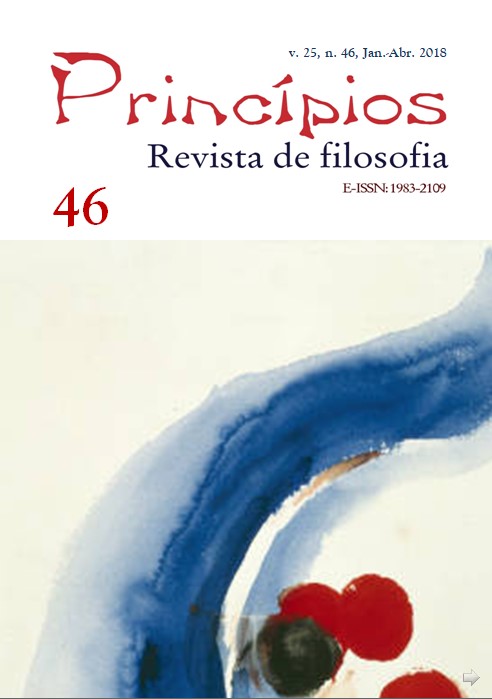Enativismo radical: exposição, desafios e perspectivas [Radical enactivism: exposition, challenges and prospects]
DOI:
https://doi.org/10.21680/1983-2109.2018v25n46ID12129Palavras-chave:
Ação, Percepção, Cognição, Representação, Racionalidade, Mente Corporificada [Action, Perception, Cognition, Representation, Rationality, Embodied Mind]Resumo
Primeiro, o enativismo é apresentado como a ideia de que a ação é constitutiva da cognição e é situado historicamente a partir da psicologia ecológica de Gibson. O enativismo radical (segundo o qual nem toda cognição é representacional) é então diferenciado de enativismo moderado (segundo o qual a cognição envolve representações orientadas-pela-ação). É feita uma defesa do enativismo radical diante da objeção de que o papel da ação na cognição é meramente causal. São avançados dois desafios para o futuro do enativismo radical: como podem emergir estados representacionais e qual é a concepção de racionalidade apropriada para este quadro teórico.
[Enactivism is first presented as the view that action is constitutive of cognition and it is historically situated as arising from Gibson’s ecological psychology. Radical enactivism (according to which not all cognition is representational) is then differentiated from moderate enactivism (according to which cognition involves action-oriented representations). An argument for choosing the former is then presented. Radical enactivism is defended from the objection that the role played by action in cognition is merely causal. Two challenges for the future of radical enactivism are advanced: how can representational states emerge and which conception of rationality fits this theoretical framework.]
Downloads
Referências
ADAMS, F.; AIZAWA, K. The bounds of cognition. Philosophical Psychology. v. 14, 2001, p. 43-64.
ADAMS, F.; AIZAWA, K. Defending the bounds of cognition. In: MENARY, Richard. (Ed.). The extended mind, Cambridge: MIT. 2010. p. 67-80.
BEER, Randy. Dynamical approaches to cognitive science. Trends in cognitive science. v. 4, n. 3, 2000, p. 91-99.
BREWER, Bill. Perception and reason. Oxford: Oxford University Press. 2003.
CAVELL, Stanley. The claim of reason. Oxford: Oxford University Press. 1979.
CHALMERS, D. J. Facing up to the hard problem of consciousness. Journal of Consciousness Studies. n. 2, 1995. p. 200-219.
CHEMERO, Anthony. Radical embodied cognitive science. Cambridge: The MIT, 2009.
CLARK, Andy. Being there. Cambridge: MIT. 1997.
CLARK, Andy; CHALMERS, David. The extended mind. Analysis. v. 58, n. 1, 1998, p. 7-19.
CLARKE, Thompson. Seeing surfaces and physical objects. In: BLACK, Max. (Ed.). Philosophy in America, Crowns Nest: Allen & Unwin, 1965. p. 98-114.
GELDER, T. Van. What might cognition be if not computation? Journal of Philosophy. v. 91. 1995, p. 345-381.
GIBSON, J. J. The Ecological Approach to Visual Perception. New York: Psychology Press. 2015.
HUMPHREYS, Paul. Emergence, not supervenience. Philosophy of Science. v. 64 (Proceedings), 1997a. p. S337-S345.
HUMPHREYS, Paul. How properties emerge. Philosophy of science. v. 64, 1997b, p. 1-17.
HURLEY, Susan. Perception and action: alternative views. Synthese. v. 129, 2001, p. 3-40.
HUTTO, Daniel D.; MYIN, E. Radicalizing enactivism: basic minds without content. Cambridge: MIT. 2013.
HUTTO, Daniel D.; MYIN, E. Evolving enactivism: basic minds meet content. Cambridge: MIT, 2017.
MARR, D. Vision. San Francisco: W. H. Freeman. 1982.
MCDOWELL, John. Mind and world. Cambridge: Harvard University Press. 1994.
MERLEAU-PONTY, Maurice. Fenomenologia da Percepção. Trad. Carlos Alberto Ribeiro de Moura. São Paulo: M. Fontes. 1994.
MILLIKAN, Ruth. Pushmi-Pullyu representations. Philosophical Perspectives. v. 9, 1995, p. 185-200.
NOË, Alva. Action in perception. Cambridge: MIT. 2004.
NOË, Alva. Varieties of presence. Cambridge: Harvard University Press. 2012.
RAMSEY, W. M. Untangling two questions about mental representation. New Ideas in Psychology. v. 40A, jan. 2016, p. 3-12.
RAMSEY, W. M. Must Cognition Be Representational? Synthese. v. 194, n. 11, jan. 2017, p. 4197-4212.
ROWLANDS, Mark. The new science of the mind: from extended mind to embodied phenomenology. Cambridge: MIT, 2010.
SELLARS, Wilfrid. Empiricism and the Philosophy of Mind. Cambridge: Harvard University Press, 1997.
SHAPIRO, Lawrence. Embodied cognition. London: Routledge, 2011
VARELA, Francisco J.; THOMPSON, Evan; ROSCH, Eleanor. The embodied mind. Cambridge: MIT, 1991.
WHEELER, M. Reconstructing the cognitive world. Cambridge: MIT, 2005.
YARBUS, A. Eye movement and vision. New York: Plenum, 1967.
Downloads
Publicado
Como Citar
Edição
Seção
Licença
Autores mantêm os direitos autorais e concedem à revista o direito de primeira publicação, com o trabalho simultaneamente licenciado sob a Licença Creative Commons Attribution que permite o compartilhamento do trabalho com reconhecimento da autoria e publicação inicial nesta revista.
Termos da licença:
| Não Comercial (NC) | Os licenciados podem copiar, distribuir, exibir e executar a obra e fazer trabalhos derivados dela, desde que sejam para fins não comerciais. |
| Compartilha Igual (SA) | Os licenciados devem distribuir obras derivadas somente sob uma licença idêntica à que governa a obra original ou menos restritiva. |


 Português (Brasil)
Português (Brasil) English
English Español (España)
Español (España) Français (Canada)
Français (Canada)


